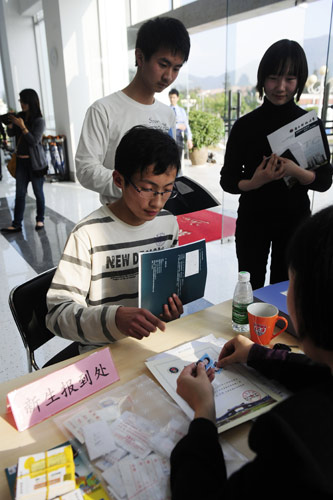Innovative university enrolls first class
 |
|
A student is registered for classes at the South University of Science and Technology of China in Shenzhen, Guangdong province, on Feb 27. |
The long-awaited South University of Science and Technology of China started its first semester on Tuesday.
The university finished its maiden enrollment period on Monday, after registering 45 Chinese students at its campus in Shenzhen, South China's Guangdong province.
The university is widely regarded as the country's first test of a new educational system meant to give the young better training in the methods used in innovative research. It chose its freshmen class from among 745 candidates who had taken examinations last year meant to test their academic achievements, imagination, understanding and innovative abilities.
Of the 50 candidates who passed, five refused the offer to attend the school.
The enrollees range in age from 10 to 18, and nearly 30 of them did not take the national college entrance exam in June 2010.
"I fully understand that the students were facing pressure from both society and their parents," Zhu Qingshi, president of the university, told China National Radio. "Forty-five (students) accounts for 95 percent of our planned recruitment. So I am satisfied with that."
Last year, Zhu decided to free the new South University of Science and Technology of China from the country's traditional education system.
Zhu's goal was to build a university that concentrates on research and has the right to grant postgraduate degrees.
But according to related regulations, a new university may only grant associates degrees and must undergo years of inspections and examinations from education authorities before it can gain the right to grant bachelor's degrees and master's degrees.
As a result, the new university will grant its own academic diplomas, which come with no guarantee that they will be recognized by the government.
Without official diplomas, graduates of the university will not be able to apply for postgraduate projects in public-funded institutions in the country, and will also be treated differently by the country's social insurance system.
Even so, the eagerness for the new university has not diminished. In an online survey last year, the South University of Science and Technology of China ranked as the educational institution of most interest to the public, according to data released by netbig.com, a Shenzhen-based education website.
But it wasn't always certain that the idea of a new type of university would become a reality. The Ministry of Education did not approve the founding of the institution until the end of 2010, and had not ratified the class enrollment until now.
Work undertaken in preparation for the university began in March 2007, and Zhu Qingshi was selected to be the president of the new institution in 2009.
For their first two years at the university, students will receive instruction in general subjects such as math, physics and politics. Three members of the Chinese Academy of Sciences will arrive at the university by March 20 and teach undergraduate courses. Every year, each student will receive a 10,000 yuan (US$1,522) scholarship from the university.
The students will then choose a research field according to their interests, and will be granted graduation certificate after earning the required credits.
The university is planning to increase the number of student it admits each year to 150 in early 2012, and to 250 in 2013.
 0
0 






